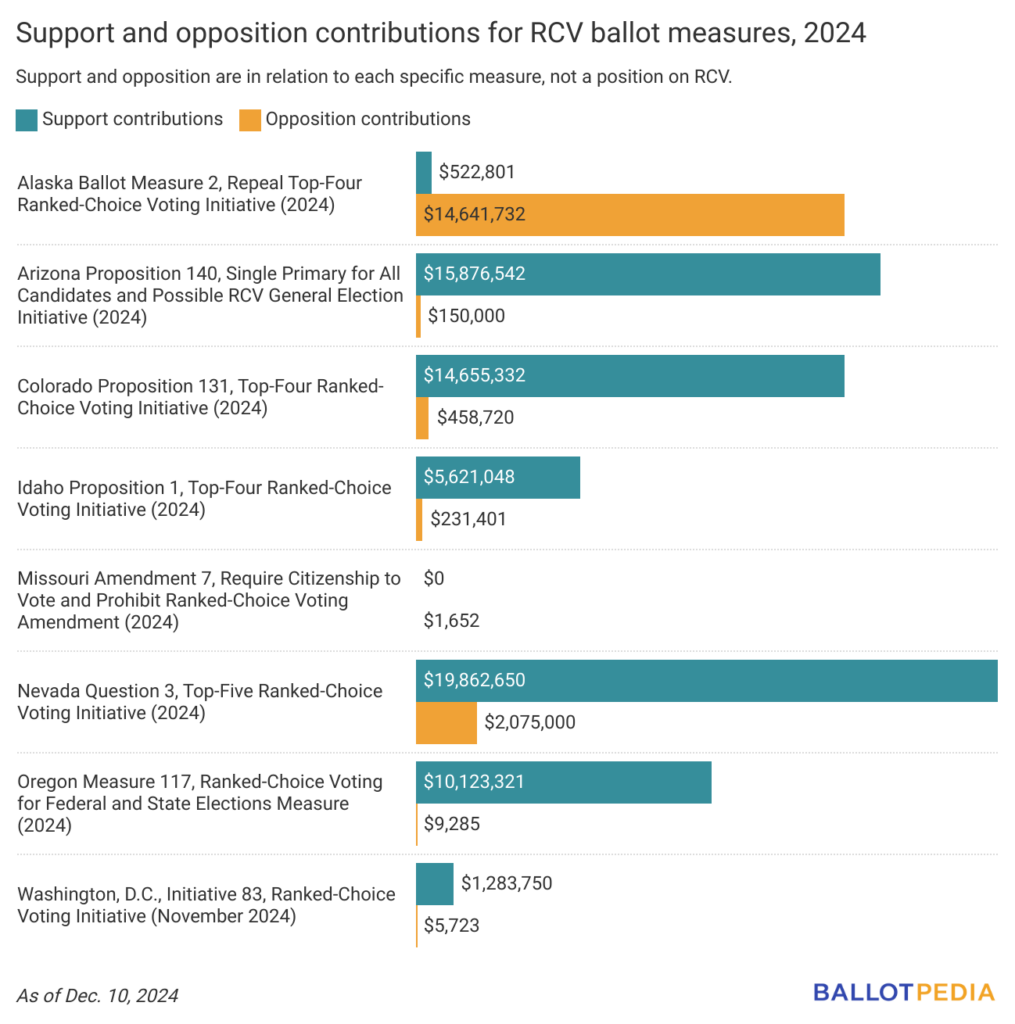In 2024, voters decided on seven ballot measures related to ranked-choice voting, the most ever in a single year. While voters in one state—Alaska—retained RCV, five measures to adopt the system were rejected in Arizona, Colorado, Idaho, Nevada, and Oregon. In Missouri, voters approved a constitutional amendment to prohibit RCV.
Voters in five localities, including Washington, D.C., also decided on RCV measures, a decrease from 2023, with seven, and 2022, with nine. Voters approved three measures to adopt RCV, rejected one to adopt RCV, which received enough votes but fell behind a competing measure, and rejected one to repeal RCV.
Statewide measures
A recount in Alaska concluded on Dec. 9, confirming that the votes to retain RCV in the state, which was adopted in 2020 and implemented in 2022, had the majority by 743 votes. The defeat of Ballot Question 2, which would have repealed RCV, is the only victory from the Nov. 5 election for RCV proponents at the state level. Voters in Arizona, Colorado, Idaho, Nevada, and Oregon defeated measures that would or could (in the case of Arizona) have adopted the system in their respective states. The average “no” vote in states that voted against adopting RCV was 58.5%, with Idaho having the highest at 70.0%.
One state, Missouri, approved an amendment to preempt the adoption of ranked-choice voting at the state level. The vote margin was 68.4% to 31.6%.
Including Washington, D.C., proponents of RCV spent over $66.1 million on statewide measures to adopt or maintain RCV as of Dec. 10, which was 20 times the amount opponents of RCV spent on statewide measures ($3.3 million). Article Four was the top donor supporting RCV, giving $17.4 million total to two campaigns supporting RCV, $13 million in Nevada and $4.4 million in Alaska. Unite America was the second top donor supporting RCV, giving $15.4 million total to three different supporting campaigns: Colorado, Idaho, and Nevada. Nevada Alliance was the top donor opposing RCV, giving $2.1 million toward the campaign to oppose RCV in Nevada.
Meredith Sumpter, CEO of FairVote, a proponent of RCV, said, “Changing the status quo is never easy. Entrenched interests–including several state parties and an increasingly well-organized national opposition–pushed back hard on this year’s statewide ballot measures. But make no mistake: The future remains bright for ranked choice voting.”
The Wall Street Journal Editorial Board said about the losses, “Perhaps RCV’s advocates will try again, but given that these measures fell short in some cases by double digits, they’ll have to ask themselves how many more millions they’re prepared to burn. That leaves Washington, D.C., which will begin using RCV in 2026, joining a few other big cities, including New York and San Francisco. Maybe the system works better in smaller environments or these kinds of one-party strongholds, where most of the political debate under the old system was taking place inside the Democratic Party anyway. In any case, it’s hard to blame voters elsewhere for deciding that they didn’t want to join the guinea pigs.”
There were four additional measures related to electoral changes: one in Arizona, two in Montana, and one in South Dakota. All four measures were defeated.
From 1965 through 2023, there were six statewide ballot measures in four states (Alaska, Maine, Massachusetts, and Nevada) that proposed adopting ranked-choice voting. Voters approved four and rejected two.
Local measures
D.C. voters approved RCV for federal and municipal elections by a vote margin of 72.9% to 27.1%.
Voters in Richmond, California decided on two measures related to electoral systems on Nov. 5. Measure L would have enacted RCV. Although Measure L was approved with a majority of votes, there was a conflicting initiative to adopt top-two primaries for mayoral and city council elections, Measure J, which received more votes. Therefore, Measure J was enacted; Measure L was not.
Two localities in Illinois, Oak Park and Peoria, approved measures showing their support for RCV. Oak Park adopted the system with 79.5% of the vote, and Peoria advised the local government to adopt the system with 67.1%. The latter was non-binding.
Voters in Bloomington, Minnesota, defeated a measure to repeal RCV by a vote of 48.7% to 51.3%, which the city adopted in 2020 with 51.2% of the vote.
Voters in Eugene and Oakbridge, Oregon, rejected efforts to adopt a different kind of electoral system—STAR voting. With STAR voting, voters rate the candidates for a given office on a scale of zero to five, with zero indicating no support and five indicating maximum support. The scores for all candidates are then tabulated, and the top highest-scored candidates advance to an automatic runoff.
Since 1915, there have been more than 150 ballot measures to adopt or repeal ranked-choice voting systems. Ashtabula, Ohio, was the first jurisdiction to approve a ranked-choice voting measure in 1915. From 1965 to 2023, there were at least 74 local ballot measures related to RCV.



